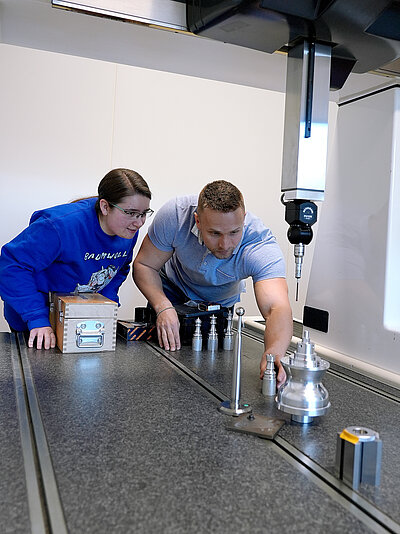An understanding of physical relationships that are practically implemented in mechanical engineering is a prerequisite. Often, the exact relationships of the scientific fundamentals are so complex that they can only be partially taken into account in a technical solution. In addition to the fundamentals, you will also learn how to apply them in practice. Simplified models and estimations, which have proven to be target-oriented, serve as a basis for this: Engineers only calculate as accurately as necessary.
In engineering, you not only deal with calculations and constructions, but as a person with a solid technical understanding, you are also a sought-after specialist in the following areas: in the application of future topics, such as the linking of machines and artificial intelligence, in the efficient use of raw materials and energy, and in administration and sales. The engineering degree program with a major in mechanical engineering is designed so that you can also acquire knowledge in related areas.
Course structure
Through a future-oriented education based on scientific principles, you will acquire a broad basic knowledge.
- You choose a specialization direction during your studies
- In internships and student research projects you apply your acquired knowledge for the first time
- By writing and submitting your thesis, you show that you are capable of working in the field of engineering
- During your studies, you will acquire knowledge from different areas - a prerequisite for being able to work in an interdisciplinary manner.
Course content
We attach great importance to the fact that our fields of study are studyable! This means that you can also take the subjects that you need for your study progress in the respective semester. For this purpose, the following specializations are possible in the field of mechanical engineering:
- Energy and building services engineering
- Industrial production
- Product development and ECO design
- Sustainable plastics and surface technology
- Cyber-physical systems
Depending on the specialization, the course content is divided into the following areas
- Scientific fundamentals (engineering mathematics, statistics, information technology, programming)
- Engineering fundamentals (statics and strength of materials, kinematics and dynamics, thermodynamics, fluid mechanics, electrical engineering, materials)
- Specialization and profiling (design, process engineering, production engineering, automation engineering)
- General skills (project management, presentation, business administration, languages)
- Practical experience (thesis, internship)
The understanding of scientific interrelationships in combination with the specific technical basic knowledge and the systematics to apply this knowledge in order to solve technical problems is a core competence of mechanical engineers and forms the focus of the education in the mechanical engineering field of study.
Focus of the mechanical engineering major: The core competence of mechanical engineers is to understand scientific relationships, to contribute technical know-how and ultimately to apply this knowledge in order to solve technical problems.
These skills are complemented by technical communication, presentation techniques and the planning and execution of projects. In order to be successful, it is especially important to convince partners at home and abroad of your solutions. You therefore need social skills as a second mainstay.
Machines and systems and their interaction are becoming increasingly complex. Every change, no matter how small, has an impact on the big picture. This makes a complex, analytical way of thinking necessary. During your studies at Hof University, you will acquire so-called interdisciplinary knowledge, i.e. knowledge from other specialist areas - a plus point for your later professional life.
Classic working fields as an mechanical engineer are among others
- in the automotive industry
- precision mechanics
- the aviation industry
- in the plastics processing industry.
In the organization based on the division of labor, however, engineering service providers - from the TÜV, to automotive development offices, to small design and planning offices, are also a numerically significant workplace for mechanical engineering specialists.
It is well known that Franconia, especially in the triangle Hof - Bamberg - Nuremberg, is one of the densest industrial regions in Europe. According to the IHK Bayreuth, mechanical engineering is the second strongest sector in the region after plastics processing.
Important industries:
- General metalworking industry, with a large number of medium-sized mechanical engineering and toolmaking companies
- automotive supplier
- plastics processing industry




